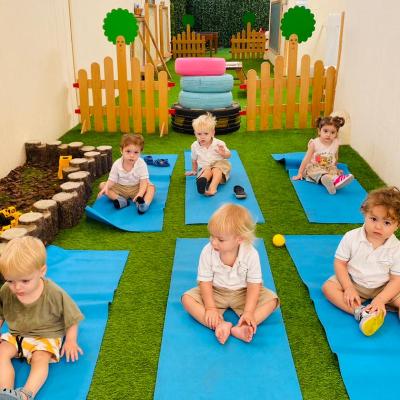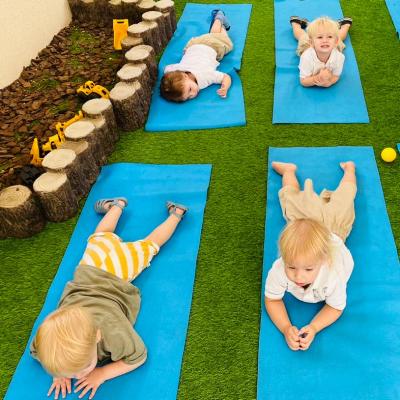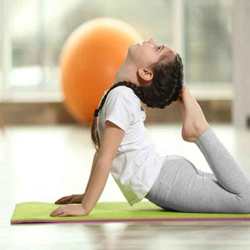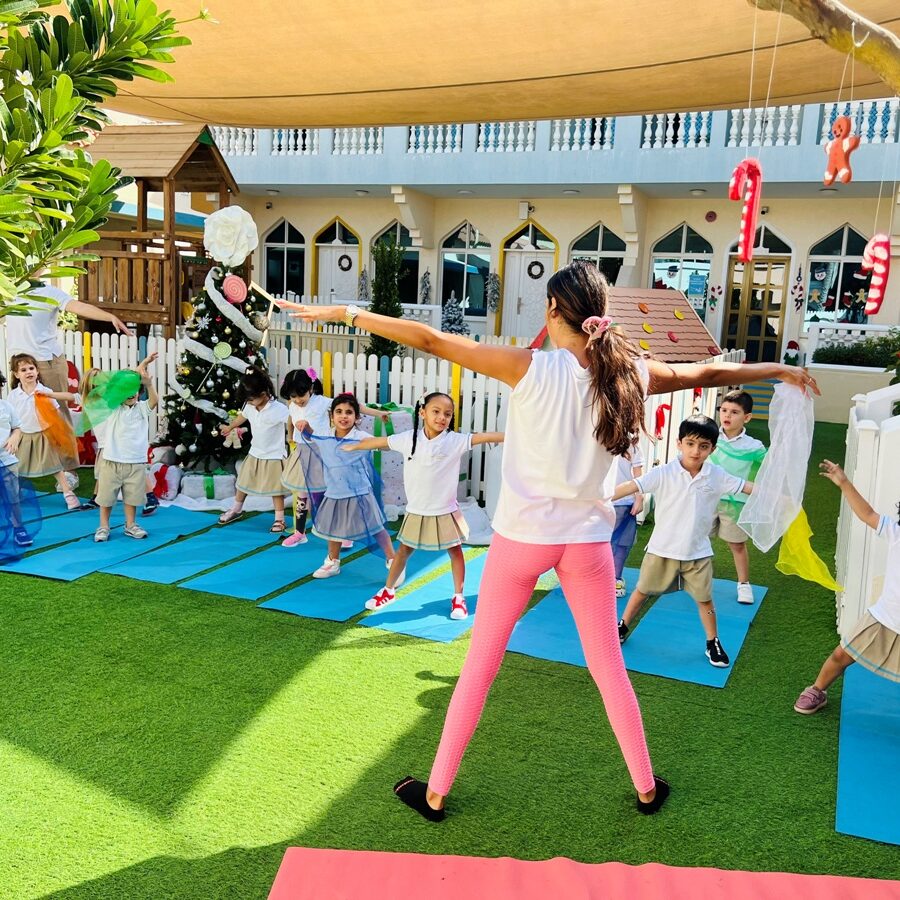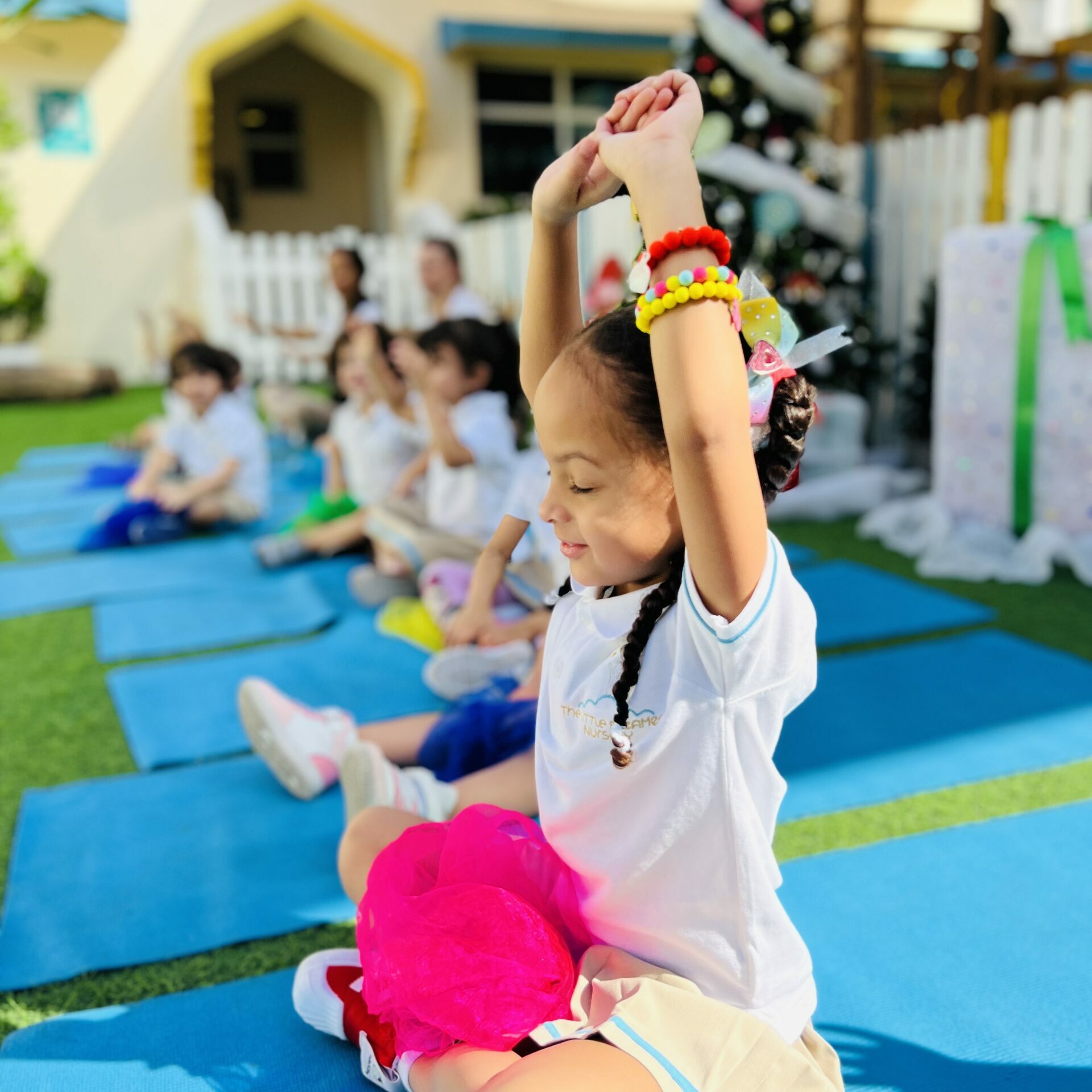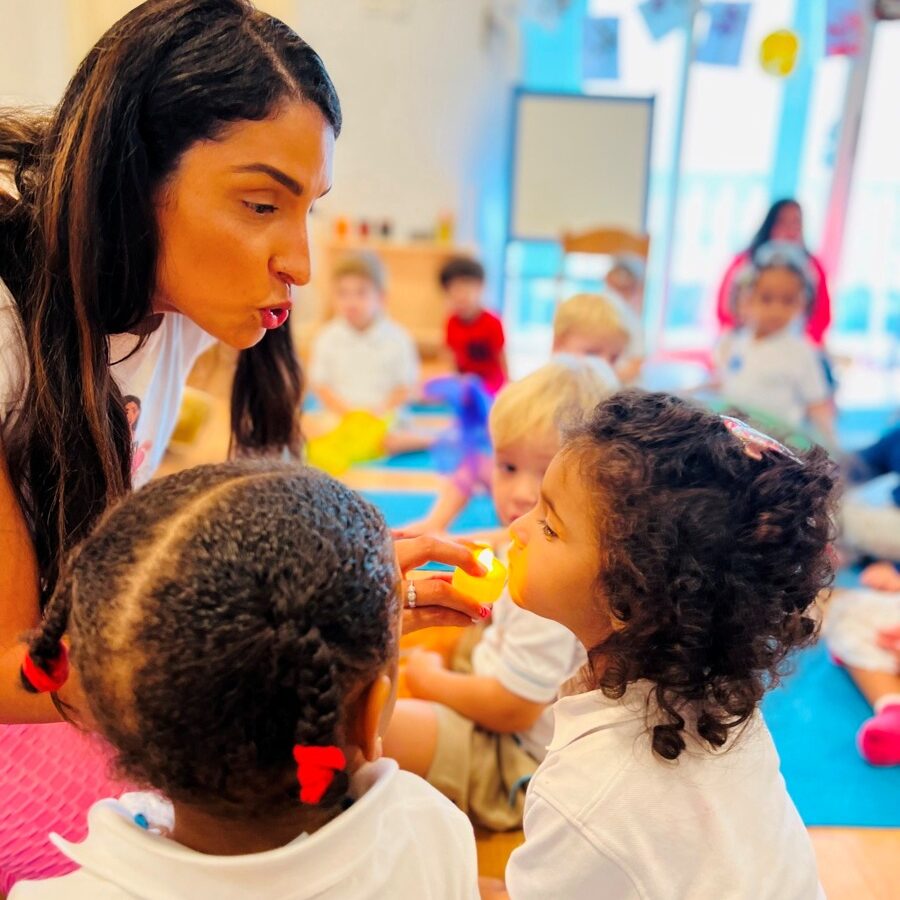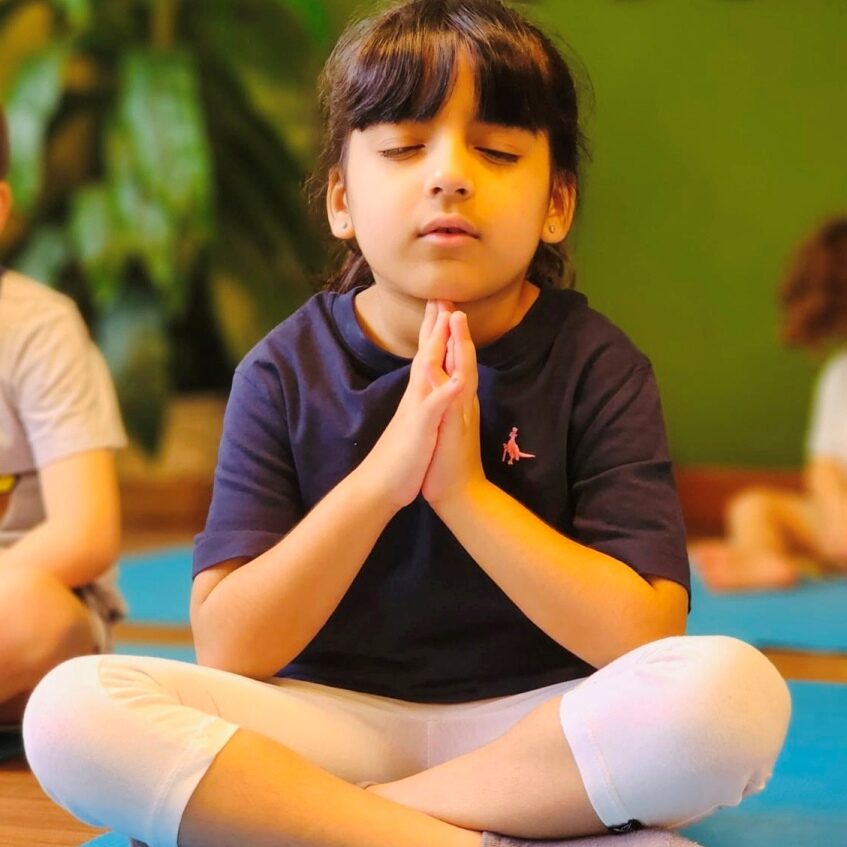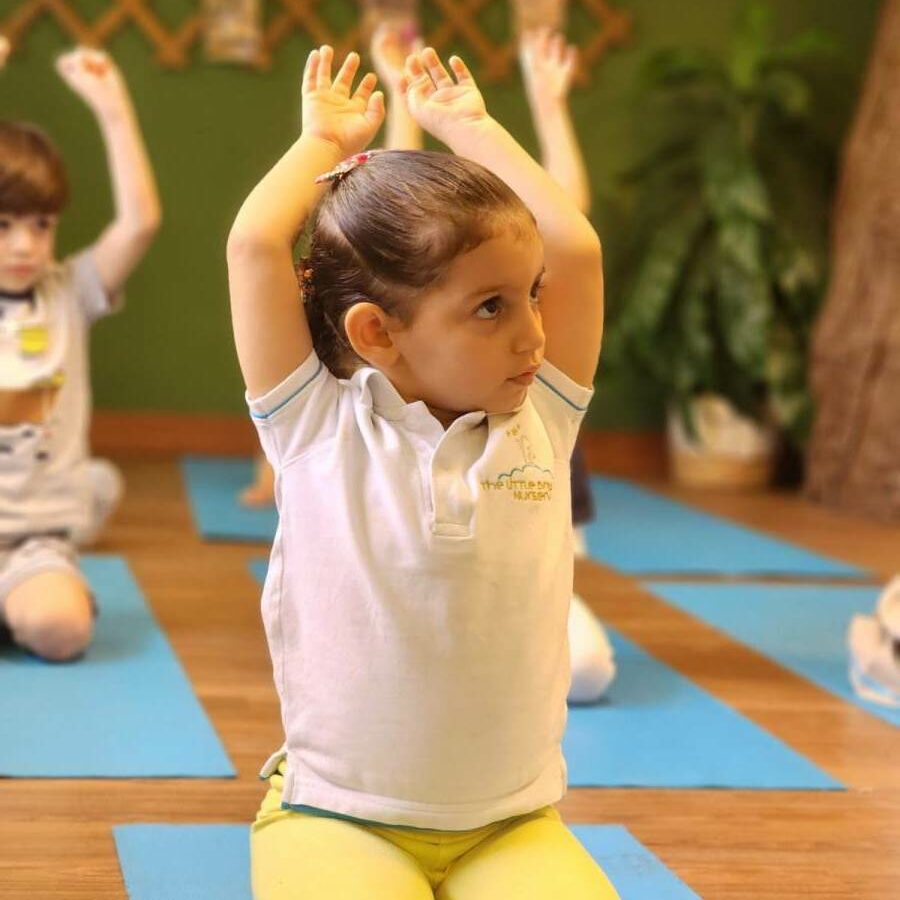Is yoga good for toddlers? Can toddlers do yoga? Of Course! Children can truly benefit from yoga in many ways, including physically, emotionally, and their mental well-being. Many research in child psychology has found that Yoga for toddlers helps youngsters stay calm and focused even when faced with difficult situations. When it comes to raising a patient and respectful child, this is an essential ability to learn. An early childhood education program incorporating a yoga program can provide children with excellent learning opportunities and emotional growth while having fun.
How does Yoga for toddlers work?
You should understand that yoga for toddlers is more than just a simplified version of adult yoga; it’s an entirely different discipline. An alternative is making kids’ yoga a positive experience that encourages concentration and self-esteem playfully. If you are asking yourself and want to know at what age should a child start yoga? We would personally recommend from four years old. In our yoga class for toddlers in Dubai, we concentrate on three main aspects when teaching yoga to children:
Stretching
An important part of this critical practice is the explicit teaching of the basic yoga postures to help children’s bodies stretch and strengthen. By putting the youngster through various yoga positions, teachers can help develop a deeper awareness of one’s own bodies in their students. A child’s strength and balance can be developed through physical conditioning.
Major Yoga for toddlers practices
Pose variation is the best Yoga for toddlers approach to pique children’s interest in yoga. To help children develop self-confidence, educators should incorporate more approachable poses into their lessons. The following are considered some of the most common yoga positions:
- Having the youngster bend their knees and sit on their heels like they’re on a chair is the Chair Pose. Once this is done, have the youngster lift their arms in front of them. Strengthens children’s leg and thigh muscles with this stance.
- Encouraging the child to lie on their stomach with rigid legs and arms in the “Superman” stance. Attempt to make the youngster look like Superman by raising their chest, thighs, and arms as high as possible. This aids in strengthening the shoulders, legs, and core in children.
- In the “banana stance,” have the youngster lift their arms over their heads with their palms facing each other while standing. Encourage the youngster to lean to one side to resemble a banana. The lower back muscles are strengthened, and the balance is improved due to this workout.
Breathing Exercises
The ability to regulate one’s breathing is a vital component of effective stress reduction. As a fundamental practice in yoga, breathing is known to help us calm our minds, reduce anxiety, and better manage our emotions. Kids yoga teaches children how to use their breath to calm their thoughts. As a result, breathing exercises can teach youngsters how to control their tantrums better and improve their emotional well-being, making them more resilient. There are several ways you may get your children to participate in breathing exercises.
- As a dragon, encourage children to inhale and exhale deeply while pretending to practice their “fire breath.”
- With the help of a straw, encourage the children to take deep breaths through the mouth and out the nose by making them sip the air.
- All the youngsters can participate in this bumblebee game, which encourages them to do breathing exercises. Plug the children’s ears with their fingers in a circle. As you inhale and exhale, make a humming sound with your nose and mouth.
Meditation in yoga for toddlers
Meditating is an excellent opportunity in Yoga for toddlers to learn about the importance of mindfulness. The regular practice of meditation can aid the development of a child’s cognitive capacities. As a result, early exposure to mindfulness promotes emotional development by allowing youngsters to reflect on their own feelings and emotions. Meditation is the most difficult of the three yoga practices for children since it is less engaging. Because of this, meditation sessions should be short and simple. The following are some suggestions for creating a peaceful setting for meditation:
- The lights are being turned down.
- Making the children close their eyes and be still.
- Encourage the kids to pay attention to the noises and sensations they encounter.
- Children should be able to recall a person they care about and why.
- As a result of these prompts, children will be exposed to concepts of mindfulness and lay the groundwork for emotional and cognitive growth.
Yoga’s Benefits for Children
Children engaged in Yoga for toddlers programmes have access to various possibilities to enhance their emotional, mental and physical growth. Here are the benefits of yoga for toddlers:
- Harmony between mind and body is essential.
- Increasing the physical endurance, flexibility, mobility, muscle strength, and coordination of children.
- The art of bringing quiet and serenity into a child’s hectic day.
- Developing patience and empathy for others.
- Self-discipline is built on a foundation of self-control and self-discipline.
- Increasing awareness of one’s own body.
- Mindfulness is a powerful tool.
- Developing a deeper understanding of oneself and one’s feelings.
- Educating young people on coping with worry and stress is an important part of this effort.
Best games of Yoga for toddlers
Another great technique to encourage Yoga for toddlers and concepts of play-based learning and engage children is incorporating games into yoga sessions. Below, we’ve gathered a brief list of helpful games:
- Simon says game: One child assumes the role of leader and establishes the poses for the group. The leader can only perform the stance if Simon says so before. Students who do not follow Simon’s instructions and accomplish the poses are disqualified. The youngsters will benefit greatly from playing this game.
- Guess the animal: In a game akin to charades, each child takes a turn assuming the position of an animal. Some other kids try to figure out what animal the kid is trying to imitate. It’s a great way to help kids improve their recall of yoga positions they’ve already learned.
- Ball game: A softball is all that is needed to play this basic game. With the group gathered around, a child will toss the ball to a classmate and tell them what yoga pose they need to perform. Throwing the ball to another student after catching it is a standard part of the position. The game is a great way for kids to learn and practice yoga poses in a fun and interesting way.
We as a nursery in Dubai delighted to provide Yoga for toddlers’ classes as part of our early childhood education program. Our comprehensive yoga in nursery approach helps children to thrive in their worlds and helps to prepare them for the next phases of their lives at school.
How can Implementing Yoga and Mindfulness support your child’s development?
It’s quite common to hear about the many benefits of yoga and mindfulness for adults. However, it’s benefits for children can sometimes be overlooked. It is possible to practice yoga and mindfulness from any age, and with it comes a magnitude of physical development benefits, and mentally.
What is mindfulness and why is it important?
Mindfulness is the practice of anybody, young or old, tuning in and paying attention to their own thoughts and feelings and learning to accept them. In children, the practice of mindfulness helps in optimising health, well-being and happiness as well as aiding them in learning vital life skills that they can take with them through life. Practicing mindfulness has many benefits, it can be used as an intervention for behavioural challenges, improves sleep quality (sleep alone without any kinds of toddler sleep problems) and results in heightened focus when practiced regularly. Recent studies suggest that stressful events in early childhood can directly contribute to physical and mental health problems, mindfulness can help to reduce this stress.
Easy ways which you can practice mindfulness
- Breathing activities- encourage your child to lie flat on their back and place their hands on their tummy. Support them in taking a deep breath in through their nose and out through their mouth, counting if it helps. Encourage your child to feel the movement of their tummy as it moves up and down with each breath.
- Listen to some calm music- there are strong links between the use of calm and soft music and relaxation in children. It might be a good idea to play this kind of music when practicing mindfulness activities to help your child engage better and relax more.
- Story telling activities which encourage your child to use their imagination and visualise as they listen are really good to support children in relaxing their mind. Start with a short, simple and familiar story before building up to longer and more complex ones. This is excellent in developing your child’s early listening and attention skills.
- Balance activities and yoga poses. Yoga and mindfulness go hand in hand, simple yoga poses which encourage children to focus on their balance and co-ordination are great ways to practice being mindful.
- Support your child in recognising their feelings and emotions and encourage them to talk about their feelings. It may help if you use a visual representation initially to help your child link together the feeling and emotion. Ensure that your child is aware that it is ok to feel this way and if it is a negative emotion that they are feeling, together you can find a solution to help them feel better. For example, if your child is angry because somebody has taken their toy you may practice taking deep breaths or counting to 10 when they start to feel this emotion.
Yoga
Yoga is an excellent way to practice mindfulness. When children learn techniques for self-health, relaxation, and inner fulfillment, they can navigate life’s challenges with a little more ease. Yoga at an early age encourages self-esteem and body awareness with a physical activity that’s noncompetitive. Below are some more advantages of yoga for children;
- Helps develop physical co-ordination, balance and body awareness- during yoga children are encouraged to move their bodies into positions that they may not have experienced before, helping to improve their balance and co-ordination skills
- Physical strength- getting themselves into the pose and holding it for a period of time naturally helps to develop muscle strength.
- Yoga helps concentration- When participating in yoga activities children are required to concentrate as they focus on moving their bodies into different poses and follow directions.
- Helps to build self-esteem and confidence- trying new things really helps to build a child’s self-esteem and confidence, you will find that the more it is practiced the more confident they will become.
Here at the Little Dreamers Nursery , this British nursery in Dubai we implement yoga and mindfulness into our daily planning and schedule. We practice relaxation to calm and soft music, yoga poses and breathing techniques.
If you need any further information or activity ideas, please feel free to contact us. We are always happy to help!

